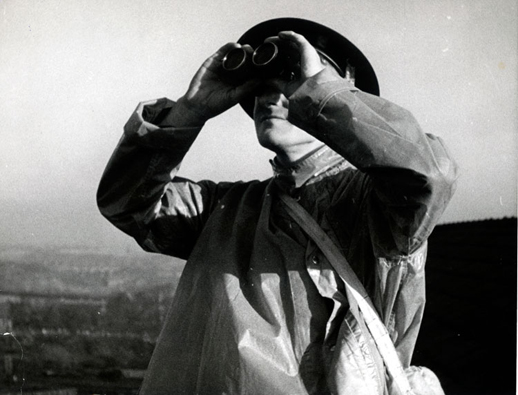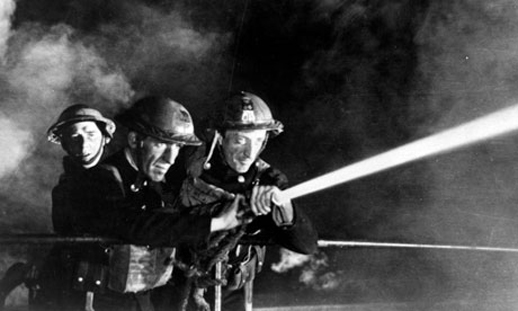
The Complete Humphrey Jennings Volume Two (DVD & Blu-ray, BFI)
Review by Ken Worpole.
Humphrey Jennings (1907 – 1950) was a photographer, stage designer, poet and literary critic who became one of Britain’s most influential documentary film-makers, making his name with a series of government-funded black and white propaganda films during the war, the most famous of which, Fires Were Started, is one of five contained in this new DVD, the second of three volumes collecting together all of his film-work.

Many people may not know these films but will certainly have seen clips from them – instantly recognisable – in programmes about life in Britain during the Second World War. The crisp, beautiful pastoral imagery, the dramatic reconstruction of fireman on a burning roof during the Blitz, Spitfires high in the sky above Kent orchards, Welsh miners at work or singing in choirs. The skilful juxtaposition of the rural with the industrial, with street life and playground songs, was largely invented by Jennings, a passionate man influenced by Surrealism, English mythology and history (and Welsh and Scottish too), and with an abiding love of music – whether classical, religious, folk or dance-hall – which he used expertly to counterpoint what was happening on the screen.
In the first short film on this compilation, The Heart of Britain (1941), he consciously used German music – Beethoven, Handel, Mozart – to point up the richness of German culture before its descent into utter madness. Anybody who has watched television at any time over the past fifty years will have seen excerpts from his filming of Myra Hess playing Mozart in the National Gallery during her famous lunchtime concerts held during the war. In all his films at some point everyone is singing. The five films included here are: The Heart of Britain (1941, 9 mins), Words for Battle (1941, 8 mins), Listen to Britain (1941, 20 mins), Fires Were Started (1943, 65 mins) and The Silent Village (1943, 36 mins).
It is this last film, The Silent Village, which for me is the most extraordinary and harrowing, and the only one I had not seen before. In 1942 an attempt was made on the life of SS officer Reinhard Heydrich in the Czechoslovakian mining village of Lidice. The retribution was instant and appalling. All the men of the village were lined up and shot, all the women sent to concentration camps, and their children deported. The village was then razed to the ground, in the attempt to obliterate its name and history. Across the world, people planted Lidice memorial gardens – there’s one in my local churchyard of St John’s Hackney – or named streets or buildings after the destroyed village. Jennings boldly transposed the story to a Welsh mining village, Cwmgiedd, and with the co-operation of the miners and their families, symbolically re-enacted the atrocity. However, the film dwelt on the communal spirit of the Welsh miners, established in shots of the sturdy chapel, the choral singing, the union committee meetings where workers unselfconsciously addressed each other as comrade, and, once again, the school playground where the children hop and skip, until the day they are lined up by the occupying soldiers and led away. It was a most chilling imagining of ‘it couldn’t happen here’.
It is easy to admire the immense technical and imaginative skill which Jennings exhibited in these dramatic and heart-wrenching documentaries, which clearly influenced other war-time films such as Alberto Cavalcanti’s 1942, Went the Day Well, and Powell & Pressburger’s 1944, A Canterbury Tale, two all-time favourites. But watching them today, they raise all kinds of anxieties about what has been lost in the way of human solidarity and steadfastness in a world in which economists and politicians insist that the only consistent human motive in society is private choice. These amazing films remind us of a time when ‘we are all in this together’ meant what it said.